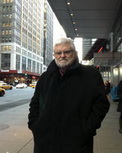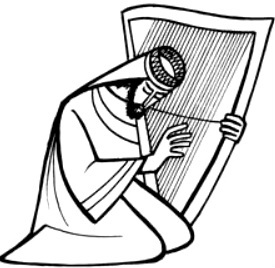 Chris
McDonnell, UK
Chris
McDonnell, UK
chris@mcdonnell83.freeserve.co.uk
Previous articles by Chris Comments
welcome here
March
15, 2017
The
Psalter: Words for a pilgrim’s
journey

Of
all the books in the Old Testament, the collection of writings that we
call the Psalms is possibly the most poetic narrative of the journey of
the Hebrew people.
There are many references in the Gospels where
Jesus quotes the Psalms, possible the most well-known were the words from
Psalm 22 uttered from the Cross
‘My
God, my God, why have you forsaken me?’
The Psalter, the name given to the Book of Psalms, has permeated Christian
liturgy ever since.
When the earliest Christian monastic communities were formed their
liturgical pattern of prayer was shaped round the psalms and to this day
their primacy of place within the lives of monks and nuns remains.
Prior to the Vatican Council, praying the Breviary was part of the
daily commitment of the priest. It came about through with the emergence
of medieval friars who could not carry the large community volumes of the
psalms on their journeys of preaching. A smaller version was required. The
text was, of course, in Latin.
Since the Council, the use of the English text of the Liturgy of the
Hours began to be used by the laity, either individually or within parish
prayer groups or similar gatherings.
The defined hours of monastic prayer concludes each day with Compline, the
night prayer of the Church. I try when I can to join with the nearby
community of Benedictine nuns for that simple, beautiful prayer. There
were occasions when the abbey dog, a white standard poodle would wander
into the chapel to join us. On one occasion it wandered around, not
willing to settle, until that is we reached the last verse of the first
psalm, psalm 4 ‘I will lie down in
peace and sleep comes at once, for you alone make me dwell in safety’ .
At that point the dog lay down and slept its way through the remainder of
night prayer. Marvellous!
The
Rule of St Benedict stresses the centrality of the psalms in monastic
prayer. In Chapter 19 we find these words.
‘On
the Manner of Saying the Divine Office
We believe that
the divine presence is everywhere and that "the eyes of the Lord are
looking on the good and the evil in every place" (Prov. 15:3). But we
should believe this especially without any doubt when we are assisting at
the Work of God. To that end let us be mindful always of the
Prophet's words, "Serve the Lord in fear" (Ps.
2:11
)
and again "Sing praises wisely" (Ps. 46[47]:8) and "In
the sight of the Angels I will sing praise to You" (Ps. 137[138]:1).
Let us therefore consider how we ought to conduct ourselves in sight of
the Godhead and of His Angels, and let us take part in the psalmody
in such a way that our mind may be in harmony with our voice.’
Over
the years there have been many collected texts of the psalms, from the
early years through the illustrated MSS of the Medieval period to our
present time. One text known as ‘the Bay Psalm Book’ has the
distinction of being the first book in English, printed and published in
America. That was in Massachusetts
in 1641. A facsimile text
was printed in 1903 and that is now available as a modern paperback.
The
singing of Psalms- and indeed they are meant to be sung as is clear from
psalm 136, ‘By
the rivers of
Babylon
we
sat and wept when we remembered
Zion. There
on the poplars we hung our harps,
for
there our captors asked us for songs, our
tormentors demanded songs of joy;
they
said, “Sing us one of the songs of
Zion
!”
How
can we sing the songs of the Lord while
in a foreign land?’, was greatly
enhanced
with the publication of the Grail Psalms. First published in 1966, this
Psalter became very familiar in the English-speaking world, particularly
when sung to the melodies of the Jesuit composer, Joseph Gelineau.
Every
time we share the Eucharist, the Liturgy of the Word contains a psalm
where each verse has a response, reminiscent of the singing of alternate
verses in choir by the monastic communities.
The
psalms and the harp have become inextricably associated with each other.
The words of psalm 136 make the point.
This
weekend, on March 17th, we celebrate the feast of Patrick,
patron of
Ireland. Associated
with
Ireland
is the Celtic harp,
the symbol of a nation. Each of us on our Lenten journey, accompanied by
the Book of Psalms, the poetic song-story of another people, has a path to
follow. Let’s remember in all our modern difficulties that the psalms of
David reflect the joys and sorrows, the pains and struggles of an ancient
people. They have much to teach us and offer help for us in our prayer.
END
-------------------------
 Chris
McDonnell, UK
Chris
McDonnell, UK Chris
McDonnell, UK
Chris
McDonnell, UK